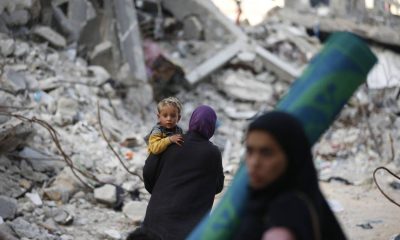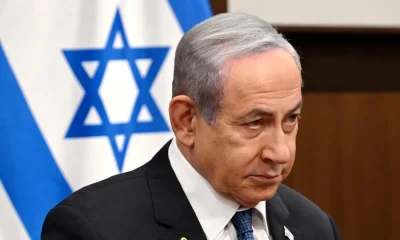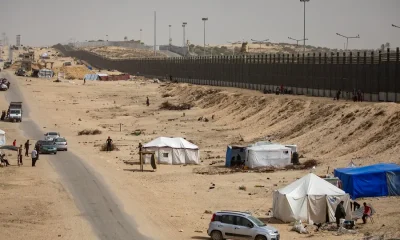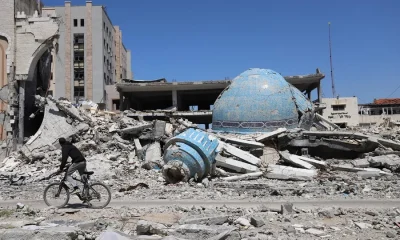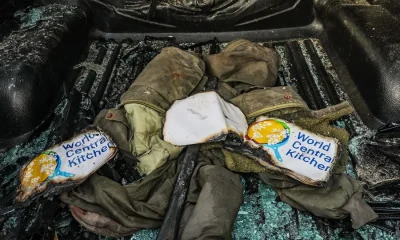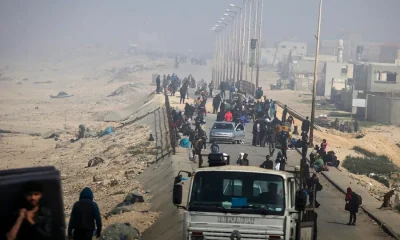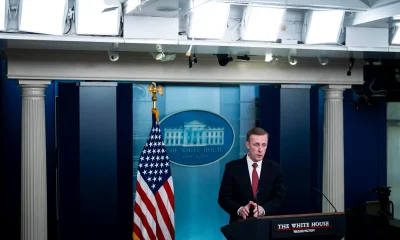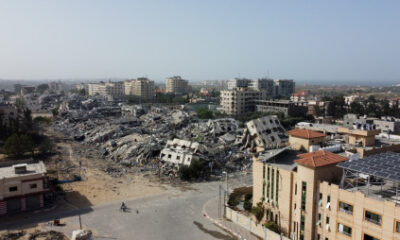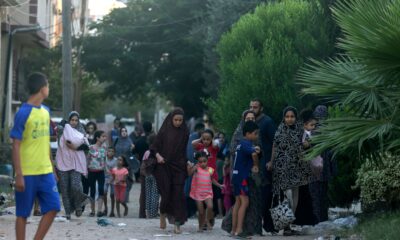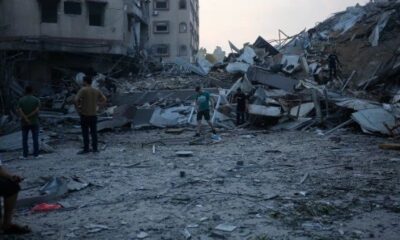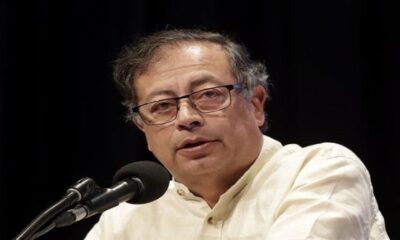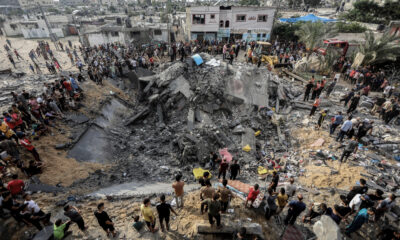International
Hamas asks to investigate Israel’s abuses and torture of Palestinians imprisoned in Gaza
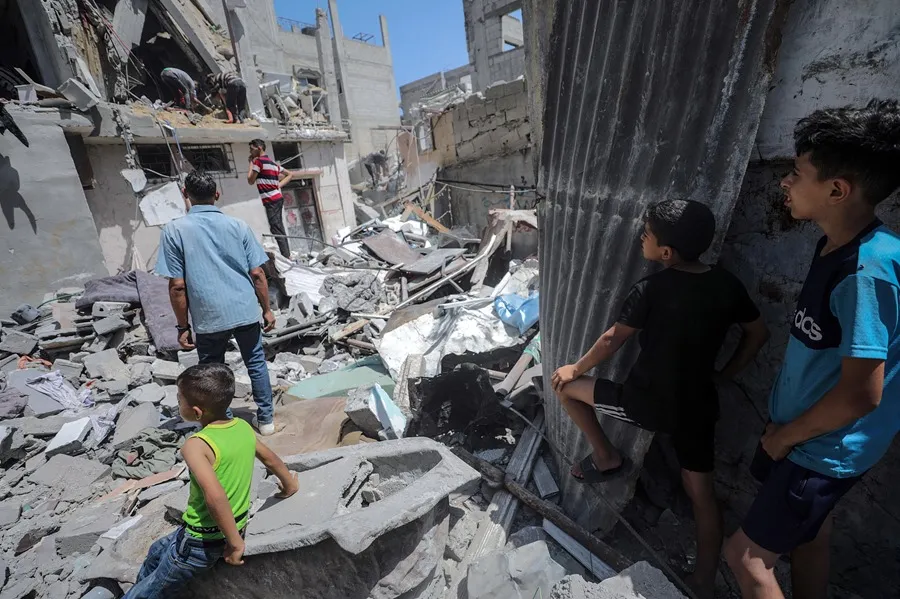
The Islamist group Hamas has called on the international community, and especially the International Committee of the Red Cross, to investigate cases of abuse and torture in Israeli detention centers against detained Gazans, as denounced by pro-human rights groups.
“The horrible testimonies about the conditions of the Palestinian detainees in the Zionist prisons continue, the last of which was that of several Palestinians kidnapped in Gaza and released today from the Zionist military prison ‘Sde Teman’,” Hamas said in a statement last night.
“Human rights institutions, in particular the International Committee of the Red Cross, must work to follow up on the conditions of the Palestinian arrested in these fascist detentions and put an end to the serious violations to which they are exposed,” he added.
His words come hours after a young Palestinian, allegedly released from Sde Teman, where he was detained for a month by Israel, was recorded yesterday in a hospital in a state of shock, barely unable to speak coherently and with signs of torture on his wrists and ankles.
On March 7, the Israeli media Haaretz denounced that at least 27 people detained in the Gaza Strip and placed in Israeli military custody had died since the beginning of the war on October 7, either at the Sde Teiman military base, the Anatot detention camp or during interrogations.
Already in December, Haaretz revealed that those arrested in Sde Teiman could remain handcuffed and blindfolded for whole days, and an internal source assured that soldiers tended to mistreat prisoners, which coincides with the testimonies of other freed Palestinians
Meanwhile, the Israeli Army intensified its attacks and incursions in the heart of the city of Rafah, south of Gaza, on Friday, with the destruction of residential neighborhoods and hand-to-hand fighting with Hamas militiamen.
As Palestinian sources confirmed to EFE, the attacks are now concentrated in Al Auda, in the center of the city of Rafah, and in Tal al Sultan, a neighborhood in the northwest.
“The whole city of Rafah is an area of Israeli military operations,” Ahmed al Sofi, mayor of Rafah, said today in a statement released by Hamas on Telegram. “The city is experiencing a humanitarian catastrophe and people are dying inside its tents due to the Israeli bombings.”
According to the mayor, there is no medical center left in operation in the city and the residents and displaced people – according to UNRWA about 65,000 people, of the 1.4 million Gazans that the city was homed before the offensive – cannot cover their daily needs for food and water.
The third point of intense military activity, as local sources reported to EFE, is still the so-called Philadelphia corridor, the border line with Egypt that Israel aspires to control, according to military sources, in order to cut the network of tunnels that supplies Hamas helps it both to rearm and attack.
Since this morning, at least 22 people have died in the Strip, according to medical sources, including five municipal workers, including the head of the emergency service, denounced the city council of Rafah.
Fatal attacks were also recorded in Zeitun, in the northern city of Gaza, which caused at least eight deaths, and in the central areas of Nuseirat and Deir el Balah, according to the Palestinian agency Wafa.
In the north, the lack of food and food is still a critical issue. According to UN data, of the 61 coordinated humanitarian assistance missions north of Gaza, only 28 – 46% – were facilitated by the Israeli authorities.
The reality in the enclave is that only a tiny minority can eat on a regular basis, in the absence of food or affordable prices. Many do it once a day and there is a lack of milk and porridge, denounce organizations on the ground.
The NGO Doctors Without Borders warned today of the psychological trauma that the war is causing to the children of Gaza, who are losing the desire to continue living surrounded by so much death.
“What we are seeing in young children, especially, are symptoms of depression because they have lost everything. They have lost their parents, their siblings, their home, their toys, everything that made their daily life normal,” the organization said in a statement.
International
ACLU seeks emergency court order to stop venezuelan deportations under Wartime Law

The American Civil Liberties Union (ACLU) on Friday asked two federal judges to block the U.S. government under President Donald Trump from deporting any Venezuelan nationals detained in North Texas under a rarely used 18th-century wartime law, arguing that immigration officials appear to be moving forward with deportations despite Supreme Court-imposed limitations.
The ACLU has already filed lawsuits to stop the deportation of two Venezuelan men held at the Bluebonnet Detention Center, challenging the application of the Alien Enemies Act of 1798. The organization is now seeking a broader court order that would prevent the deportation of any immigrant in the region under that law.
In an emergency filing early Friday, the ACLU warned that immigration authorities were accusing other Venezuelan detainees of being members of the Tren de Aragua, a transnational criminal gang. These accusations, the ACLU argues, are being used to justify deportations under the wartime statute.
The Alien Enemies Act has only been invoked three times in U.S. history — most notably during World War II to detain Japanese-American civilians in internment camps. The Trump administration has claimed the law allows them to swiftly remove individuals identified as gang members, regardless of their immigration status.
The ACLU, together with Democracy Forward, filed legal actions aiming to suspend all deportations carried out under the law. Although the U.S. Supreme Court recently allowed deportations to resume, it unanimously ruled that they could only proceed if detainees are given a chance to present their cases in court and are granted “a reasonable amount of time” to challenge their pending removal.
International
Dominican ‘False Hero’ Arrested for Faking Role in Nightclub Collapse That Killed 231

A man identified as Rafael Rosario Mota falsely claimed to have rescued 12 people from the collapse of the Jet Set nightclub in Santo Domingo—a tragedy that left 231 people dead—but he was never at the scene.
Intelligence agents in the Dominican Republic arrested the 32-year-old man for pretending to be a hero who saved lives during the catastrophic incident, authorities announced.
Rosario Mota had been charging for media interviews in which he falsely claimed to have pulled survivors from the rubble after the nightclub’s roof collapsed in the early hours of April 8, during a concert by merengue singer Rubby Pérez, who was among those killed.
“He was never at the scene of the tragedy,” the police stated. The arrest took place just after he finished another interview on a digital platform, where he repeated his fabricated story in exchange for money as part of a “media tour” filled with manipulated information and invented testimonies.
“False hero!” read a message shared on the police force’s Instagram account alongside a short video of the suspect, in which he apologized: “I did it because I was paid. I ask forgiveness from the public and the authorities.”
Central America
Nicaraguan Exiles to Mark 7th Anniversary of 2018 Protests with Global Commemorations

The Nicaraguan opposition in exile announced on Thursday that it will commemorate the seventh anniversary of the April 2018 protests against the government of President Daniel Ortega and his wife, Rosario Murillo, with events in Costa Rica, the United States, and several European countries.
The commemorative activities—which will call for justice for the victims, as well as freedom and democracy for Nicaragua—will include religious services, public forums, cultural fairs, and other public gatherings, according to official announcements.
In April 2018, thousands of Nicaraguans took to the streets to protest controversial reforms to the social security system. The government’s violent response quickly turned the demonstrations into a broader call for the resignation of President Ortega, who is now 79 and has been in power since 2007.
The protests resulted in at least 355 deaths, according to the Inter-American Commission on Human Rights (IACHR), although Nicaraguan organizations claim the toll is as high as 684. Ortega has acknowledged “more than 300” deaths and maintains the unrest was an attempted coup d’état.
-

 Central America4 days ago
Central America4 days agoHonduran Police Offer $135K for Tips Leading to the Arrest of Romeo Vásquez
-

 Central America3 days ago
Central America3 days agoPetro questions Ecuador’s vote, cites reports of military control and arrests
-

 International4 days ago
International4 days agoMPV Denounces Electoral Blockade as Secretary-General is Disqualified for May Elections
-

 International2 days ago
International2 days agoArsenal stun Real Madrid at the Bernabéu to reach Champions League semifinals
-

 International4 days ago
International4 days agoMaduro Plans Major Workers’ March on May 1st to Defend Venezuela’s Freedom
-

 International2 days ago
International2 days agoBogotá residents line up for yellow fever vaccine amid national alert
-

 International1 day ago
International1 day agoDominican ‘False Hero’ Arrested for Faking Role in Nightclub Collapse That Killed 231
-

 Central America1 day ago
Central America1 day agoNicaraguan Exiles to Mark 7th Anniversary of 2018 Protests with Global Commemorations
-

 International2 days ago
International2 days agoMexico refuses to restore ties with Ecuador while Noboa remains in office
-

 International2 days ago
International2 days agoDeSantis’ immigration crackdown sparks alarm in Venezuelan Communities in Doral
-

 International3 days ago
International3 days agoColombia: Search continues for missing limb of italian scientist found dismembered
-

 International2 hours ago
International2 hours agoACLU seeks emergency court order to stop venezuelan deportations under Wartime Law
-

 Central America2 hours ago
Central America2 hours agoUN complaint filed against Costa Rica over detention of migrant children














